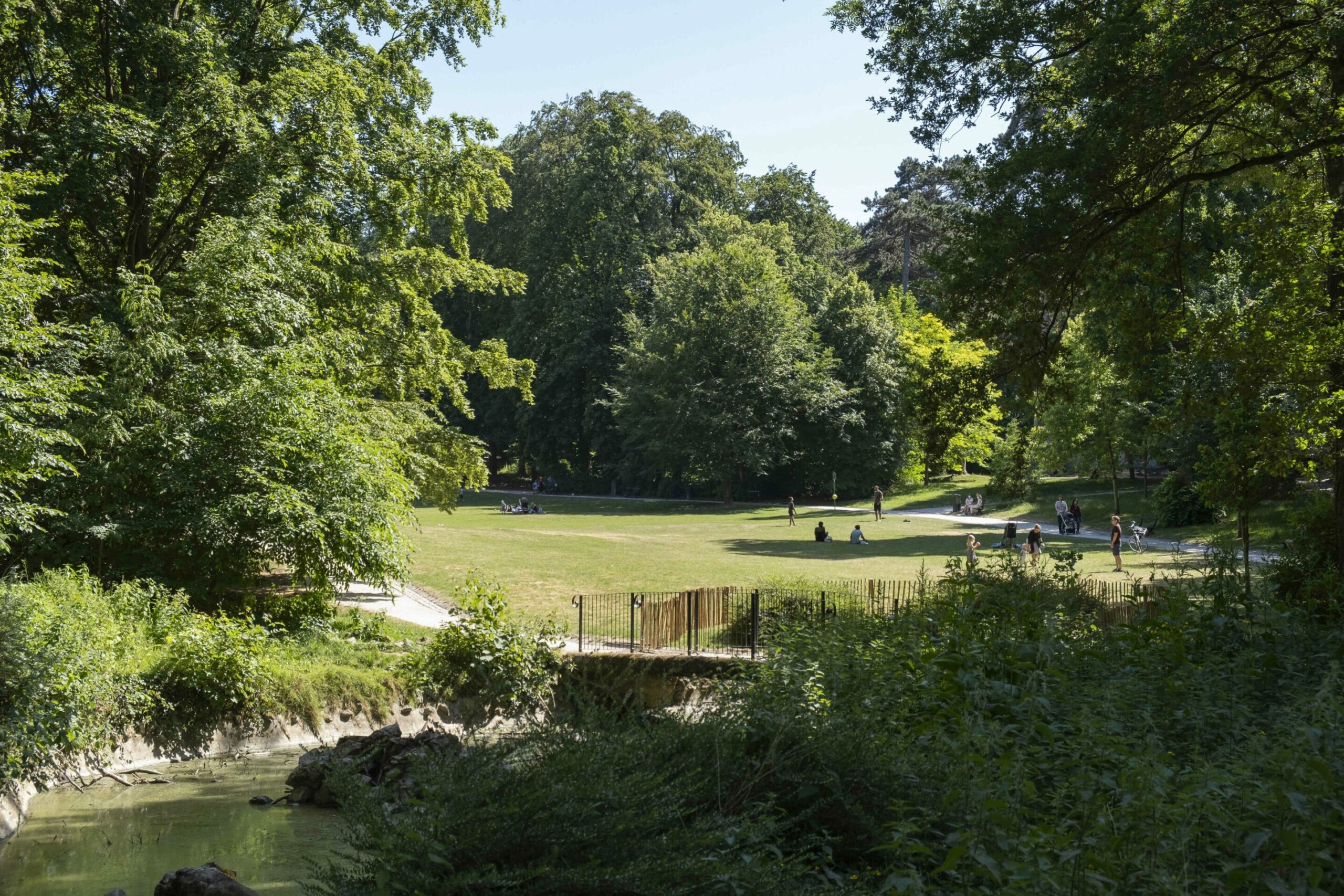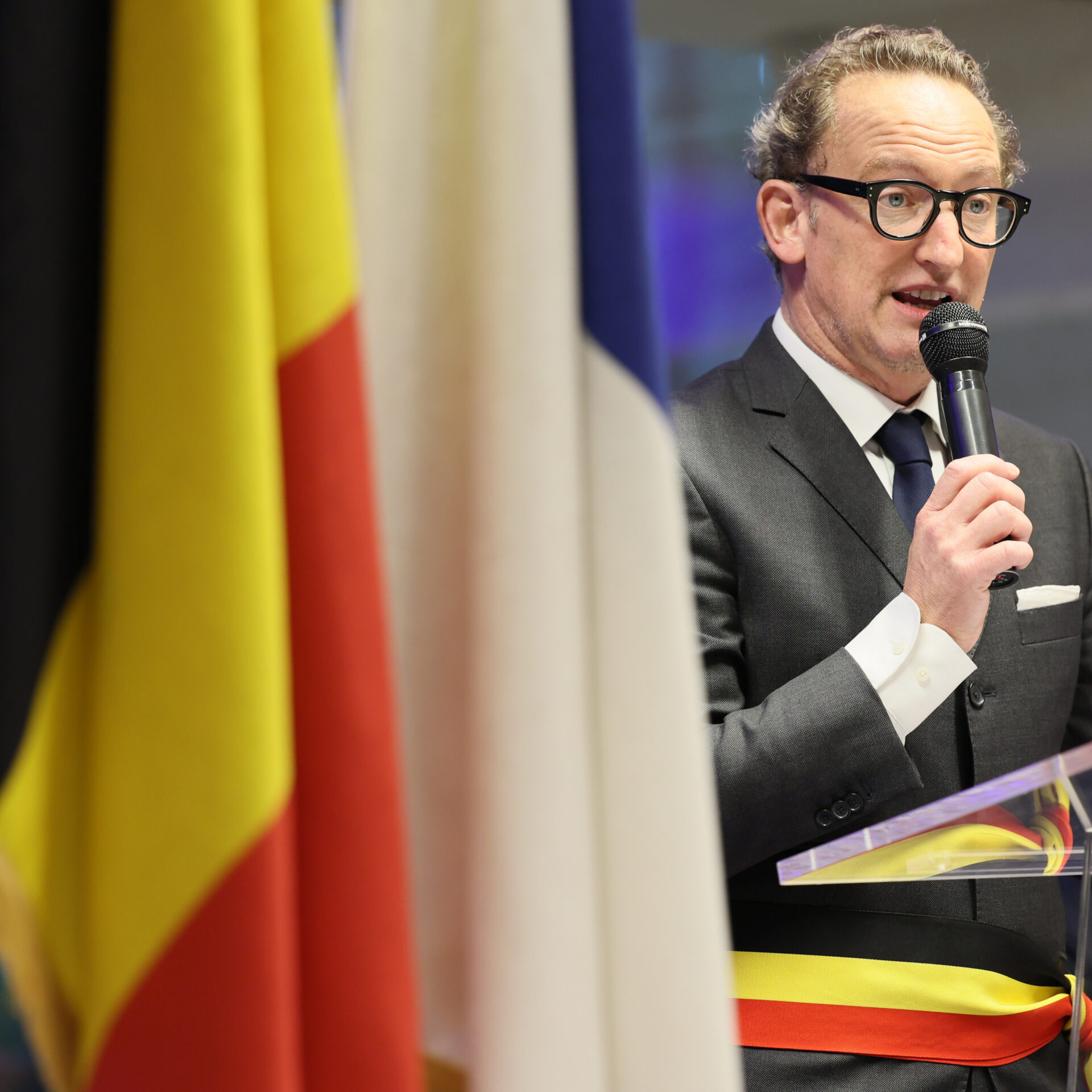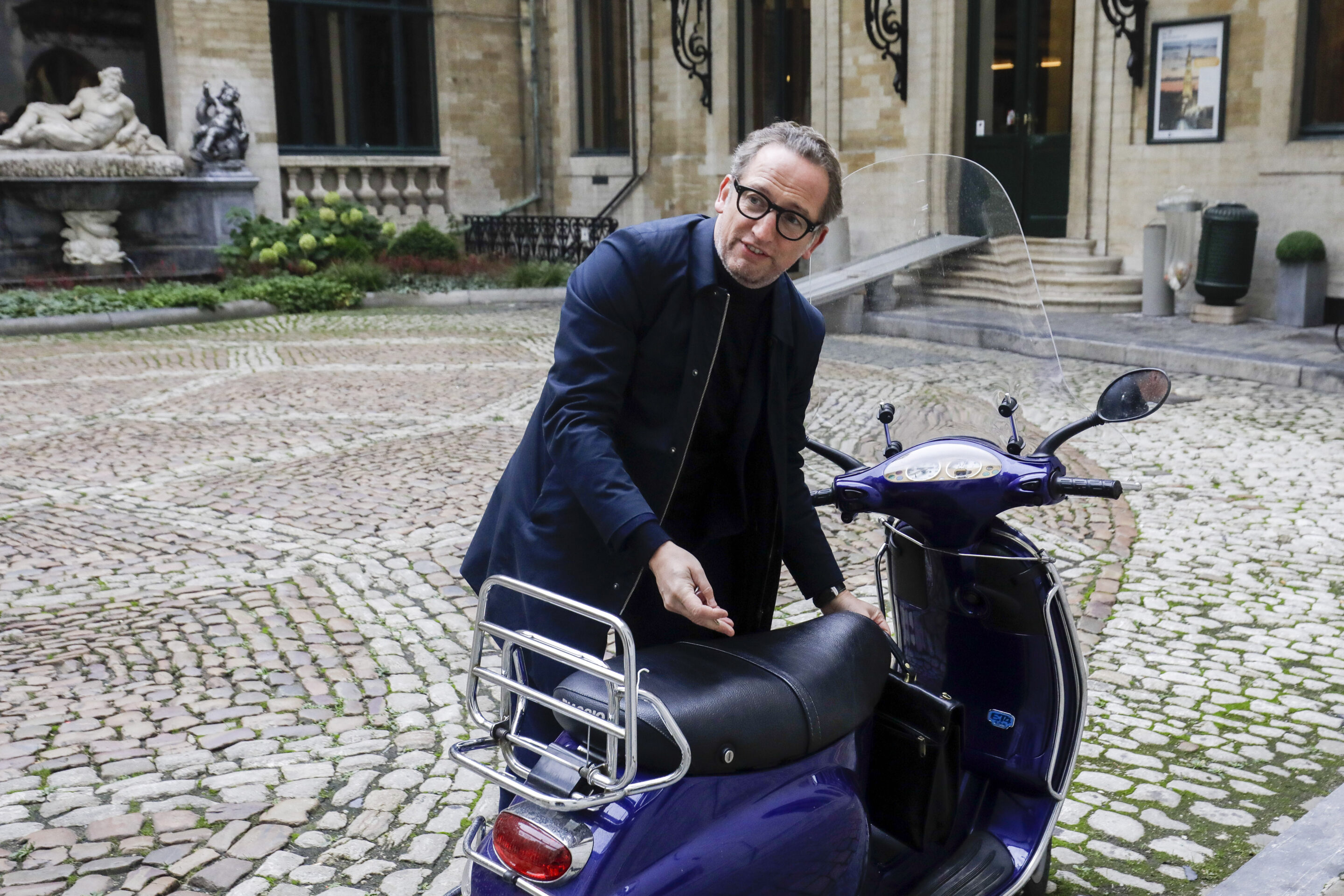It’s a good thing I’m early for my interview with Boris Dilliès, the bourgmestre of Uccle, because I’ve come to the wrong place.
I’m standing in front of what turns out to be the former town hall on Place Jean Vander Elst, where wedding ceremonies still take place but where the mayor no longer resides. His office recently moved to a sprawling complex on Rue de Stalle, a brisk 10-minute walk away.
With its glass design and modern interiors, the renovated 1970s office building that now hosts the local government of Uccle feels more like a corporate headquarters, which seems appropriate for a municipality that, as a bastion of the liberal Mouvement Réformateur (MR), is known for its business-friendly policies.
Sitting at a coffee table in his stylishly furnished office on the fifth floor, his mayoral sash slung casually over a coat rack by the door, Dilliès says the new building is the proudest achievement of his seven years in office (he became mayor in 2017 and was re-elected in 2018).
For someone who’s often portrayed by his detractors as the last man standing in the fight to keep cars on the streets of Brussels, Dilliès sounds surprisingly like an eco-warrior when discussing the new town hall’s bona fides.
“We used to be spread over seven different sites,” he says. “We had very high levels of energy consumption. This new building on the other hand is exemplary in terms of energy savings. We are heated and cooled with riothermal energy, which allows us to recover energy from the sewers. And we have 250 square metres of solar panels.”
Buzzing phone
We’re speaking on the mayor’s second day back at work after the holidays. He says things are a bit “chaud” – by which he means busy, not warm. His phone keeps buzzing with messages, but he never bothers to look at it. Instead, he reels off a list of his other accomplishments.
“There was the management of the Covid crisis, which was extremely complicated, and where local governments were in the front line,” he says. “It wasn't easy, but I think we did the best we could. Then there’s the local prevention partnerships which we introduced in six neighbourhoods, where citizens now have a direct link with the police. And for the first time in 25 years, we haven't increased local taxes. We are the only Brussels municipality that has managed to invest in projects like this building without increasing taxes.”

Wolvendael Park in Uccle. Credit: Belga/ Paul-Henry Verlooy
His biggest regret, he says, is that he hasn’t yet managed to renovate Place St Job, the lively market square at the heart of Uccle that is also a busy traffic junction.
Dilliès, who is married (to Clémentine Barzin, a Brussels regional politician) and has a two-year-old daughter, was born in Uccle in 1972 and has lived there for most of his life. At the tender age of 15, he became a local activist for MR. In 1994 he lost his first bid for a seat on the local council, but he went on to secure a seat at the next elections. He worked as a political advisor to various MR politicians before becoming a full-time politician himself.
For some, Uccle’s image is that of a hunting ground for the rich and famous, littered with SUVs, home to many French fiscal exiles who escaped former French President François Hollande’s wealth tax. But Dilliès says this is “a caricature”.
“It's a middle-class community, actually. It’s not the Beverly Hills of Brussels. It is an extremely diverse municipality, with a dozen neighbourhoods, with extremely different social make-ups. Twenty percent of our budget is devoted to social policies, so we continue to show significant solidarity with the Ucclois who are not rich at all. Regardless of neighbourhood, people are happy to live here.”
Dilliès says that if re-elected this year, his future policies will take account of this diversity. “In some neighbourhoods, we will be more focused on public safety-related expectations. In others, on solidarity and the environment. In yet others, on the needs of local businesses. We have always taken particular care to invest in public safety, but also in school buildings, in sports buildings, in public spaces, in the quality of life in general.” He has plans for a national hockey stadium and a public natural pool.
Litter crackdown
But the mayor’s top priority is a crackdown on litter. “In the 1970s, Uccle was much cleaner than today. Why? Because we have a lack of civility. Back then we had 10 people sweeping the streets, now it’s 80. We could continue to invest hundreds of thousands in infrastructure and municipal staff, but that's not what we should do. We need to educate people, starting with children, through their schools. And we count on the children to educate their parents.”
During his term in office Dilliès gained notoriety for his opposition to Good Move, the plan by the Brussels regional government to tackle congestion, pollution and safety on the roads of Belgium’s capital by making more room for pedestrians and cyclists and reducing traffic speeds.

Uccle Mayor Boris Dillies delivers a speech at the official inauguration of the new administrative center of Uccle Brussels, Tuesday 18 October 2022. Credit: Belga / Benoit Doppagne
But he insists his views are more nuanced than his opponents make them out to be. “You have too much dogmatism on both sides. There is not a good right-wing mobility policy and a bad left-wing one. We need to balance things. We need to take account of the evolution of transport. Drivers should not be stigmatised, but it would be a mistake to keep everything as it is. We need parking spaces, but we also have to create an environment that is more comfortable for cyclists and pedestrians. Other big cities have achieved this balance.”
Unlike other big cities though, Brussels does not have an all-powerful central mayor. Instead, many policies are left up to its 19 municipalities, which often disagree on issues as mundane as clearing snow. Dilliès says that for him, having a central mayor is not a taboo.
At the last local elections in 2018, Dilliès’ MR party secured one-third of the vote. This time he aims to win an absolute majority. He hopes more of Uccle’s foreign residents – many of whom, as EU citizens, are entitled to vote – will take part in the ballot.
As to what the future holds, Dilliès wants to continue to combine his role of mayor with a small, part-time teaching job at the European Communication School, which is based in Uccle. He says he has no plans to go into national politics, but he also doesn’t rule it out. “I’ve never considered this to be a stepping stone to something else.”
Asked about the legacy he will leave for Uccle, Dilliès says he doesn’t think about it much. “I'm not the kind of guy who gets excited by the idea of having his name on a plaque. What interests me is to be fulfilled in what I do and to be able to make a contribution.”
And with that, he finally picks up his phone.

